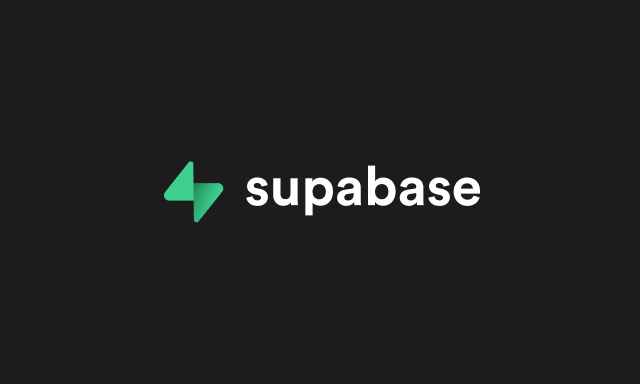Supabase JS SDK
Isomorphic JavaScript SDK for Supabase - combining Auth, Database, Storage, Functions, and Realtime.
Guides · Reference Docs · TypeDoc
Usage
First of all, you need to install the library:
npm install @supabase/supabase-js
Then you're able to import the library and establish the connection with the database:
import { createClient } from '@supabase/supabase-js'
// Create a single supabase client for interacting with your database
const supabase = createClient('https://xyzcompany.supabase.co', 'public-anon-key')
UMD
You can use plain <script>s to import supabase-js from CDNs, like:
<script src="https://cdn.jsdelivr.net/npm/@supabase/supabase-js@2"></script>
or even:
<script src="https://unpkg.com/@supabase/supabase-js@2"></script>
Then you can use it from a global supabase variable:
<script>
const { createClient } = supabase
const _supabase = createClient('https://xyzcompany.supabase.co', 'public-anon-key')
console.log('Supabase Instance: ', _supabase)
// ...
</script>
ESM
You can use <script type="module"> to import supabase-js from CDNs, like:
<script type="module">
import { createClient } from 'https://cdn.jsdelivr.net/npm/@supabase/supabase-js/+esm'
const supabase = createClient('https://xyzcompany.supabase.co', 'public-anon-key')
console.log('Supabase Instance: ', supabase)
// ...
</script>
Deno
You can use supabase-js in the Deno runtime via JSR:
import { createClient } from 'jsr:@supabase/supabase-js@2'
Custom fetch implementation
supabase-js uses the cross-fetch library to make HTTP requests, but an alternative fetch implementation can be provided as an option. This is most useful in environments where cross-fetch is not compatible, for instance Cloudflare Workers:
import { createClient } from '@supabase/supabase-js'
// Provide a custom `fetch` implementation as an option
const supabase = createClient('https://xyzcompany.supabase.co', 'public-anon-key', {
global: {
fetch: (...args) => fetch(...args),
},
})
Support Policy
This section outlines the scope of support for various runtime environments in Supabase JavaScript client.
Node.js
We only support Node.js versions that are in Active LTS or Maintenance status as defined by the official Node.js release schedule. This means we support versions that are currently receiving long-term support and critical bug fixes.
When a Node.js version reaches end-of-life and is no longer in Active LTS or Maintenance status, Supabase will drop it in a minor release, and this won't be considered a breaking change.
⚠️ Node.js 18 Deprecation Notice
Node.js 18 reached end-of-life on April 30, 2025. As announced in our deprecation notice, support for Node.js 18 was dropped in version
2.79.0.If you must use Node.js 18, please use version
2.78.0, which is the last version that supported Node.js 18.
Deno
We support Deno versions that are currently receiving active development and security updates. We follow the official Deno release schedule and only support versions from the stable and lts release channels.
When a Deno version reaches end-of-life and is no longer receiving security updates, Supabase will drop it in a minor release, and this won't be considered a breaking change.
Browsers
All modern browsers are supported. We support browsers that provide native fetch API. For Realtime features, browsers must also support native WebSocket API.
Bun
We support Bun runtime environments. Bun provides native fetch support and is compatible with Node.js APIs. Since Bun does not follow a structured release schedule like Node.js or Deno, we support current stable versions of Bun and may drop support for older versions in minor releases without considering it a breaking change.
React Native
We support React Native environments with fetch polyfills provided by the framework. Since React Native does not follow a structured release schedule, we support current stable versions and may drop support for older versions in minor releases without considering it a breaking change.
Cloudflare Workers
We support Cloudflare Workers runtime environments. Cloudflare Workers provides native fetch support. Since Cloudflare Workers does not follow a structured release schedule, we support current stable versions and may drop support for older versions in minor releases without considering it a breaking change.
Important Notes
- Experimental features: Features marked as experimental may be removed or changed without notice
Contributing
We welcome contributions! Please see our Contributing Guide for details on how to get started.
For major changes or if you're unsure about something, please open an issue first to discuss your proposed changes.
Building
# From the monorepo root
npx nx build supabase-js
# Or with watch mode for development
npx nx build supabase-js --watch
Testing
There's a complete guide on how to set up your environment for running locally the supabase-js integration tests. Please refer to TESTING.md.





